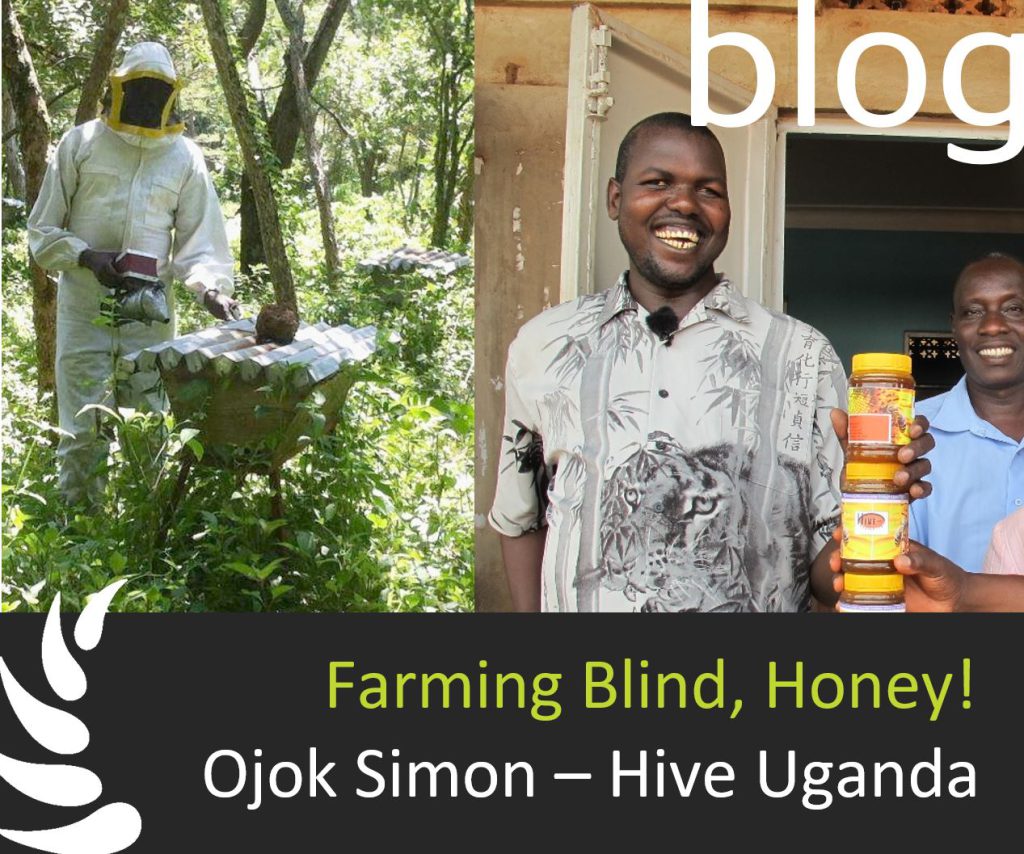Farming Blind, Honey!
by Ojok Simon – HIVE Uganda – founder and ceo
Just close your eyes for a minute and think about how you would farm and keep bees if you cannot see! You probably think that this is impossible… However, it works!
Digging the soil, getting dirty, practicing crop husbandry, and keeping bees are all activities that can be done by using touch, taste, and smell. And it makes up an excellent combination since agriculture and bees need each other. Beekeepers need crops with flowers for nectar to feed bees to eventually harvest honey, while flowers need pollinators, and that’s what bees do best.
In Uganda, agriculture forms the major source of employment for about 75-80% of the population.
So, you might be curious to know how blind people can keep bees?
HIVE Uganda is an organization that trains blind people in the rural community of Northern Uganda in beekeeping. They learn the basics of beekeeping, honey harvesting as well as the marketing of bees’ products. They are then given start up support to start their own bee farm at home. By selling bee products, the rural blind beekeepers get a the chance to generate their own income so they can support their families.
HIVE Uganda’s vision is to see blind and partially sighted people in rural community of East Africa becoming successful entrepreneurs. The training is used as a tool to achieve this vision.
Once a beehive has been set up, and the bees are getting busy, the beekeepers have some time on their hands. This can easily be utilized to grow crops like beans, peas, bananas among others. Let me share the story of Okello Patrick Owiyo with you. Everyone in Nwoya district knows him as Owiyo the blind beekeeper.
Six years ago, he was trained by HIVE Uganda and has since managed ten common traditional Ugandan beehives. Over the years he received some more training and with gained experience he was able to run his bee farm well. He has good mobility and orientation skills and has the courage to move about without his white cane snapping his fingers using sound as his guide while moving along narrow foot pathways leading to his garden.
Walking to the field of his bee farm, Owiyo realized that there is plenty of agricultural fertile land that his family was not utilizing. With his bee hive being close by he decided to use part of the land for crop production. Each year he has grown maize, beans, peas, and groundnuts on a total are of 3 to 4 acres of land. Currently, Owiyo is harvesting his groundnuts. An important part of the training is to feel leaves of the different plants so every blind farmer can detect which plant is part of the crop and which is part of weeds that need to be removed.
In Uganda, like in many other countries, disabled and blind people are seen as a burden for society. The blind face stigmatization and discrimination. However, combining beekeeping with crop growing, Owiyo has been able to increase income from earning less than $200 per year to $1200+ per year. There is sufficient food for his family, and he can meet other basic needs like buying clothes, medical care, and shelter.
Over the years, Owiyo’s self-confidence has grown significantly, but not only that, the main success lies in a mindset change of the public, who now shows respect to Owiyo and other blind entrepreneurs.
There are many blind people in Uganda who did not have a chance like Owiyo had, so therefore Hive Uganda continues its mission!
More information can be found on http://www.hiveuganda.org/

